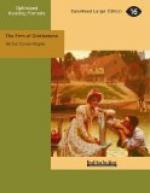Looking round her, Kate saw that they were passing through a large country village, consisting of a broad main street, with a few insignificant offshoots branching away on either side. A church stood on one side, and on the other the village inn. The door was open and the light shining through the red curtains of the bar parlour looked warm and cosy. The clink of glasses and the murmur of cheerful voices sounded from within. Kate, as she looked across, felt doubly cheerless and lonely by the contrast. Girdlestone looked too, but with different emotions.
“Another plague spot,” he cried, jerking his head in that direction. “In town or country it is the same. These poison-sellers are scattered over the whole face of the land, and every one of them is a focus of disease and misery.”
“Beg your pardon, sir,” the surly driver observed, screwing round in his seat. “That ‘ere’s the Flyin’ Bull, sir, where I be in sarvice, and it ain’t no poison-seller, but a real right down good house.”
“All liquor is poison, and every house devoted to the sale of it is a sinful house,” Girdlestone said curtly.
“Don’t you say that to my maister,” remarked the driver. “He be a big man wi’ a ter’bly bad temper and a hand like a leg o’ mutton. Hold up, will ye!”
The last remark was addressed to the horse, which had stumbled in going down a sharp incline. They were out of the village by this time, and the road was lined on either side by high hedges, which threw a dense shadow over everything. The feeble lamps of the wagonette bored two little yellow tunnels of light on either side. The man let the reins lie loose upon the horse’s back, and the animal picked out the roadway for itself. As they swung round from the narrow lane on to a broader road Kate broke out into a little cry of pleasure.
“There’s the sea!” she exclaimed joyfully. The moon had broken from behind the clouds and glittered on the vast silvery expanse.
“Yes, that’s the sea,” the driver said, “and them lights down yonder is at Lea Claxton, where the fisher-folk live; and over there,” pointing with his whip to a long dark shadow on the waters, “is the Oilywoite.”
“The what?”
“The Isle of Wight, he means,” said Girdlestone. The driver looked at him reproachfully. “Of course,” said he, “if you Lunnon folks knows more about it than we who are born an’ bred in the place, it’s no manner o’ use our tryin’ to teach you.” With this sarcastic comment he withdrew into himself, and refused to utter another word until the end of their journey.




